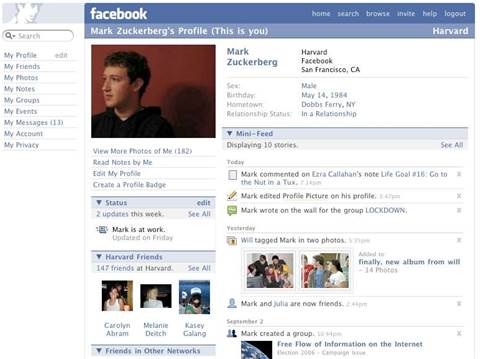The advertising system, dubbed Beacon, let partner sites like eBay and Sony advertise the fact that someone had bought something from them. Users can click on a Beacon box on the site if they want to keep their purchases secret, but in many cases the box disappears after 20 seconds and consent is assumed to have been given.
This aroused the ire of campaign groups like MoveOn.org, which organised a Facebook group with over 59,000 members protesting the system. Protesters complained that the system assumed consent, and Facebook has said user will actively have to opt into the system in the future.
"Facebook deserves credit for taking a huge step in the right direction. Their decision will hopefully set a precedent for all websites—that the wish lists of corporate advertisers must not be put before the basic rights of Internet users," said MoveOn.org spokesman Adam Green.
"When sites like Facebook listen to Internet users and take big steps in the right direction, a little positive feedback goes a long way in encouraging them to keep it up."
The move will be a setback for those who are looking to monetise the social networking phenomenon. Facebook's 23-year-old founder, Mark Zuckerberg was reported to be seeing the Beacon system as a litmus test for social networking advertising and this puts Facebook's value in question.
Part of the problems behind the Beacon launch may have been down to timing. Some Facebook users complained that their Christmas gifts were being revealed by the site.
One user, Sean Lane from Boston, told The Washington Post that he had his festivities spoiled when Beacon sent an alert to his wife.
It said: "Sean Lane bought 14k white gold 1/5 ct diamond eternity flower ring from Overstock.com."
The message even had a web link to the Overstock site which revealed that the ring was sold at half-price. In response, Overstock abandoned the Beacon service.
Facebook backs down on ad plans
By
Iain Thomson
on Dec 3, 2007 3:25PM

Got a news tip for our journalists? Share it with us anonymously here.
Partner Content

How Expert Support Can Help Partners and SMBs Realize the Full Value of AI

MSPs with a robust data protection strategy will achieve market success
.jpg&h=142&w=230&c=1&s=1)
New Microsoft CSP rules? Here’s how MSPs can stay ahead with Ingram Micro

Promoted Content
Have ticket queues become your quiet business risk?

Shared Intelligence is the Real Competitive Edge Partners Enjoy with Crayon







.jpg&w=100&c=1&s=0)








_(1).jpg&q=95&h=298&w=480&c=1&s=1)


